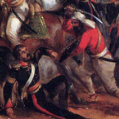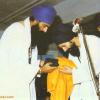Search the Community
Showing results for tags 'sikhi'.
-
WJKK WJKF, I have been wanting to marry a girl who belongs to another caste. We've been together for a few years now and have been trying to move our relationship forward. My parents have been adament on not letting this happen whereas her parents are ready to move forward since the day my partner convinced them to overlook my caste. Despite me trying to explain to my parents that she is what I would want as my life partner and what our house would need as a daughter in law (ie. family-centric, caring, vegetarian, wants to progress in Sikhi with me, and etc.), caste is the only thing they see. My parents have even said said to let her go and find someone in my caste and they'll be happy (which is funny because there are not that many people of my "caste" around me anyways so regardless, it would have been be impossible for me to even find anyone unless they'd want me to marry my cousins or distant cousins lol). Ideally they want to arrange my marriage. I have explained so much that these caste differentials are not important anymore now and should've never been. And that Gurbani itself condemns this many times. I guess I can't bring Gurbani more into this as I would be a hypocrite since I am still struggling in some aspects of Sikhi and gradually working towards a Gurmat mindset. But anyways, they don't want to listen. They are worried more about what will relatives think and that our so called "enemies" will laugh at our family. And they keep saying they had so many "reeja" for my marriage (I think this would translate to expectations of getting me married in their idealistic way). I feel like the underlying issue is that they don't want to "lose" their son as they feel like they won't have as much "control", for lack of a better word, if my wife turns out to be a total nutshell and destroys the family or something lol. I tried to console them on this matter as my partner isn't that way and wants to live within my family in harmony. I have always been the obedient child out of choice so they won't have to deal with any extra nonsense in life from my end (until now I guess in their perspective). With Guru ji's Kirpa, I've graduated, have a well paying job, and carry my own weight. I continue to live at home and have my share of family responsibilities. I believe it's my duty. I have done nothing to show my parents that I can't make logical/well thought out decisions in life. So I'm not sure why they can't trust my decision of being with my partner. My partner wants to live the same lifestyle with my family as that is what she was looking for as well. I can't think of being with anybody else. The over-infatuation or honeymoon phase is long gone and we want to convert our relationship into a life of living responsibly with Sikh values and subtracting the negative Punjabi cultural values (flashing wealth, caste discrimination, gender discrimination, alcoholism, God-men Dera worship, chuggli nindya, you name it). How can I convince my parents? It has been taking me so long trying to convince them and has taken a toll on my mental health. I don't want to elope and run away from home as that would not be Gurmat. It would tear me apart and be unfair to her family as they have been understanding and are basically on standby until my family is on board. Has anybody else been in a similar situation? Any suggestions would be much appreciated!
- 5 replies
-
- caste
- intercaste
-
(and 1 more)
Tagged with:
-
For some sikhi is not dependant on kesh , however the truth is Guru Nanak has done parchaar on this subject , a few reminders
-
Gurfateh ji, I am in my early 20's and don't get along with my grandma. she really knows how to get under my skin. She's not even like an evil grandma or anything. Just a normal everyday bibi. She is always lingering, nagging to do housework. She's super negative towards my dad and muttering under her breathe. On top of that she is amritdhari without any understanding of gurmat which really annoys me. Wears kakkar but will never teach me punjabi or sit down have gurmat vichaar or want to change mentality. Yet she will end every conversation with "Challo, Vaheguru de hatha vich ee aa" reluctantly after 1 hr of being unsatisfied about her life. I feel guilty for wanting to do things my own way; hermit zone, listen to kirtan and katha and do chores separate (I concentrate better + chores done quicker). I don't want to talk to bibi as I find most content unnecessary. Her whole life is about housework and revolves around that so I be formal and respectful but that's it. I have to force myself to talk for her mental wellbeing so she doesn't feel alone. Then I feel drained personally, feeling spiritually empty/ disconnected cos havn't had enough katha/ kirtan/ vichaar/ sangat to remind of real purpose. Even if we don't talk, it's like she is always sending negativity towards me. (?Idk if going crazy). If someone is an elder I don't automatically respect them. If they have gian, gurmat, positivity then I do truely love and respect them, regardless if blood relationship or not. But if all that has been collected in negativity, hypocrisy then I have no need/ desire to respect bcos i seek more than that. I also lowkey resent that she never passed on knowledge e.g. about punjabi, meanings of gurbani cos she doesn't know. It's just about mundane things like making sabji... which sorry bibi, I know it's your life purpose but for me I know and can make it and that's it. I don't need to talk about daal sabji, housework etc to fill out my day. And then this contaminates my own sikhi cos look at me now... I am unsatisfied and complaining about another human being. It's taking away from my life, where this energy should be focused on Vaheguru. I don't want to end up like my family and put housework etc before sikhi. It's like a mix of hormones, generational differences in thinking, spiritual ego of mine, cultural guiltyness for not respecting elders, and no1 lack of experience in grist jeevan skills. Please help. Some insight to how to establish some sort of common ground? Anyone have similar experiences or am I the only rotten'' child?
-
Watched this video as it came up on my recommendations , Niddar comes across as unstable , and forcefully distorting everything to cater to RSS line that we are just another form of Hindu... of course Whitey doesn't know any better ...so what to do ?
- 39 replies
-
1
-
- distortion
- sikhi
-
(and 2 more)
Tagged with:
-
Waheguru Ji Ka Khalsa, Waheguru Ji Ki Fateh! Here is a question i I received from a Christian who is studying Sikhi: “If waheguru is eternal and encompasses the universe (but not limited to just the universe itself) and has existed always and will always continue to exist, how did ego enter into at least part of the world? if waheguru is inside all things including humans, at what point did parts of waheguru (by parts I mean humans, animals etc) get "infected" with ego? It would stand to reason that something pure like waheguru could never succumb to ego. for example the gurus or fully realized people will never succumb to ego again, correct? so if waheguru existed eternally, how did ego enter? has ego also existed eternally with waheguru? (I don't think this is the Sikhi standpoint). Is it possible for waheguru to cease existing permanently, or for waheguru to tell lies? I would assume that it would not be, since it goes against waheguru's nature, correct? Why would waheguru create confusion/ego/illusion and cause part of itself to be deluded? How do Sikh's know then that the Gurus never made a mistake, if as you say it's possible for a fully realized person to become deluded? Based on this, is it even possible that waheguru spoke some falsehoods or lies, even in the SGGS or part of the Sikh teachings?” How would you answere this question?
-
Reprogramming ourselves........very interesting talk by Jagraj Singh. Wish I could have met and talked to this brother. All the best for 2018, I hope it stretches us all to new levels.
- 41 replies
-
3
-
Why the hell does a website about sikhi have such a ridiculous name? "To the max"???? why not go the whole hog and call it "***********" or "sikhiindahouseniggaz" i despair with some of the downright behvkoofi in our kaum...... wjkk wjkf
-
Say you have a young brother or sister or you have your own kids... How would you stop or guide them from converting to another religion or leaving Sikhi altogether and become atheist? In Islam and christianity the kids are brainwashed quite heavily against leaving the faith which would mean eternal hellfire for the disbeliever and only path to salvation is following that faith. Does Sikhi have anything like that in scriptures which we should be teaching our people so that they do not take lightly the thought of leaving the protection and beauty of Sikhi. I know there is verses which state without the Guru there is no salvation (of the soul) in this life...
-
some people may think that Naam Simran is just for Sants. As per Gurbani, it is imperative for everyone. what is Naam Simran? For those who do not know or understand Gurbani or Panjabi, it means to lovingly remember God's Name. I have to admit when I first read Gurbani, I thought 'Naam', 'Name', was used metaphorically. How could so much power be ascribed to something so simple? It took me a while to convince myself that Guruji was actually taking about Naam, Name, and not being metaphorical.
-
Hi, This has probably been discussed before but it's something I can't really wrap my head around. I'm a singh with full beard and have cousins who are the same, we are finding it difficult to find Sikh girls as life partners. The ones I've been introduced to have a problem with me not cutting my beard and being vegetarian etc... few have asked me if I would cut my beard etc... this coming from supposedly Sikh girls and it's quite disgraceful. I've had more interest from girls who are not Sikh...i.e Gujarati, English girls etc.. who don't seem to care about me being a full singh, it's raising questions in my head about the future of Sikhi as a whole, our Sikh girls are moving away from our faith/traditions and adopting western values and ways above all. One of my cousins got fed up and cut his beard in the hopes to be more 'accepted', but I feel this is the wrong choice to make. I'd be lying if I said the thought didn't cross my mind but I don't want to move away from Sikhi just to find a wife, but it seems like our Sikh girls are. Suppose this is more of a rant than a question as such.
-
How should Sikh Sangat get youth more into sikhi and educate other religions because a lot of youth don't know about our rich history I was thinking of a programme or some kind of YouTube stream and put kirtan Katha and Q&As how should we educate youth such as me into gurbani and sikhi
-
Waheguru Ji Ka Khalsa, Waheguru Ji Ki Fateh! I have a friend who is a Sikh from France, and he lives near no Gurdwara. He is looking for a sangat and someone to help him out. The problem is that he contacted the Gurdwaras in france multiple times, but they have not responded. Please help!
-
Can Sikhism flourish in South America? I have heard there some Sikhs in mexico. But can we not do more. Or do our leaders only care about helping terrorist rohinga. We are not exactly a big religion in terms of numbers. What can be done in South america. Do we have the structures in place throughout the world with adequate funding? Lets looks at Islam. Thousands of mexicans have recently converted to Islam sawing the seeds for Islamic sharia and domination in South america. Yet Sikhs even though we are a wealthy community cannot do any type of missionary programe. Infact we are plaine useless when it comes to spreading our faith. Is it any wonder that Sikhs will eventually become a very tiny insignificant population and people with no political voice or power in the world. We are more concerned with silly little affairs, that we are losing the reality of the bigger picture. Our faith is under threat from extermination. Yet all we really care about is having a glassy and bhangra and making sure our turban is tied correctly. Its time Sikhs all across the world woke up and smelt the coffee before it is to late. Missionary work needs to begin in every country in every continent in every village. We need to show that we want people to join our faith. Instead of preaching that all religions are the way to God and it does not matter if you are Sikh or not. Boleeeeeeeeeeeeeee Soni ni haal Satsriakal
-
Is conversion to Sikhi welcome ? I wasn't born in India (we only go there once every three years to meet relatives) so I can't really read the Gurmukhi script or any proper punjabi script....... My parents took me to a gurudwara regularly as the closest temple was too far, and my hindi was weak so I didn't want to go there anyway. I'm aged 16 - 20 if that matters.
-
The Sikh Theory of Dual Sovereignty. The three paramount aims of Nanakianism, ab initio, are: 1.) The reorientation of the individual from a base creature- a creature of the senses- to a spiritually attuned and intuitive being. 2.) The consecutive reorientation, and arraignment, of societal atrophy vis-a-vis equality and universalism. 3.) The establishment of a corporate base from whence the downtrodden and oppressed can be made to realize their status as founts of all civic authority and be steeled to resist both socio-political and politico-religious tyranny. Guru Nanak Dev Ji, the initiator of the ethos, openly decried the incumbent powers of his time who continually eschewed the fundamental rights of their subjects. A witness to both Brahminical (Caste) and Shariat (Islamic) totalitarianism, the Guru sundered his acolytes from traditional Indic spirituality which emphasized a quietist attitude towards life and mandated the spiritual seeker to retreat from societal concerns. (1) Via the Guru’s perception, both ruler and the ruled were equally culpable in the atrophy of the socio-political paradigm, ‘The emperors be insatiable beasts, their viziers be the curs. The Age is a knife, the kings be the butchers. In such darkness, the moon of morality is nowhere visible.’ (2) ‘…the subjects, blind, and devoid of knowledge divine pay bribes to satisfy their overlords’ avarice.’ (3) His was a faith which challenged the individual to offer their head, figuratively and literally, in pursuit of societal betterment and resistance in face of authoritarian oppression. (4) Rejecting the Semitic theory of man’s inherent imperfectness, in toto, the Guru bowed to his acolyte Angad and nominated him as his successor. The ideology of Nanakianism, thus, was identified as being paramount than the corporeal body. Angad who imbued it in full was transformed into Nanak II whilst his predecessor discarded his own mortal coil for the heavenly realms having laid the edifice of a Sui generis faith and nation. It was, essentially, the continuation of a revolution which in time would herald the raising of a corporate entity dedicated to challenging the might of all absolutist states and their pretensions of being the sole focal points of all dedication and loyalty. The arraignment and subsequent execution of Guru Arjan Dev Ji, Nanak V, at the hands of the theocratic Islamic Mughal state- far from altering the complexion of the Sikh faith as most modern historians contend- acted as a catalyst for Nanakianism’s rapid evolution. Acknowledging that the times were not conducive for dialogue Guru Arjan advised his successor to arm himself, and after investing himself with sovereign regalia, to raise an army and construct a seat of power. It was in the latter vein that Guru Hargobind Sahib Ji ascended the steps of the newly constructed Akal-Takhat in 1606 A.D. and, after having been coronated Guru, promulgated the principle of Miri-cum-Piri or dual sovereignty. Nanak Ihad mandated his acolytes to accept the worldly life in full and the responsibilities it entailed. Nanak VI not only renewed this mandate but explicated it in full through the concepts of Miri and Piri. This principle of dual sovereignty, fundamentally speaking, posited that the individual was the fount of all political authority and that he/she must owe their allegiance to truth and morality (5) rather than any political state. The state, as Schulse, contends cannot lay claim to absolutism and divine perfectness without forfeiting it’s right to rule as the very notion of it’s perfectness is imperfect. (6) Such a state would necessarily lay claim to the right to govern not only the bodies but also the minds of it’s subjects exclusively which is a hazardous and Orwellian notion in all respects. The unfolding of Sikh history from the 17th century onwards, then, must be analyzed in the light of the Miri-Piri doctrine in order to grasp the antagonism which the faith-cum-nation has continually displayed towards historic and post-modernist states. The salient facets of Miri-Piri, generically, stipulate that: 1.) The State is self-limited and cannot lay claim to absolute perfectness irrespective of it’s governing model. 2.) The government of any State is Primus inter paras rather than potentate as the subjects of a state are the focal points of all civic authority and not the government itself. (7) 3.) Truth and morality outweigh political prerogative(s). 4.) The State is an expression of power, it’s government the tool to exercise this power. The individual, essentially, is the fount from whence this power originates. Vis-a-vis the Khalsa, the collective body of the Sikhs, the doctrine is more explicit: 1.) The demarcation between State and Faith must be reflected in the set-up of any political entity qua the Sikhs; faith -in this case- means righteousness and when the State digresses from it the Sikhs are to initiate dialog with the powers that be or ,failing that, resort to the sword. Guru Gobind Singh Ji, Nanak X, aptly sums up this principle in his Zafarnamah: ‘When all forms of tolerance and mediation are breached, it is righteous to resort to the sword (force)…’ (8) 2.) The Sikhs, as per their own metalegal charter, must be dealt with impersonally i.e. through the aegis of impersonal law rather than arbitrary self-will. (9) 3.) The State must generically realize that it is a tool and governance is a privilege. The government is Primus inter paras and it should realize that in due course it’s perceptions will clash with those of other civil groups. It cannot lay claim to absolutism, perfectness and/or an individual’s pristine loyalty. (10) 4.) The Khalsa- corporate collective of the Sikh nation- being a body of the pristine, has been bequeathed the sovereignty of both the spiritual and temporal realms. When dealing with it, the State cannot atomize it into singular figures vis-a-vis political policy. (11) Following protracted discussions with Bahadur Shah, the fanatical Aurangzeb’s successor, Guru Gobind Singh Ji initiated the occultist Madho Dass into the Khalsa and re-named him Banda Singh Bahadur. Bahadur, now reformed from his ascetic ways, was dispatched to the Punjab as Commander-In-Chief of the Khalsa forces; his mandate, if put simply, was to avenge the atrocities committed on the Guru’s Sikhs and pave the way for Halemi-Raaj or a just State. Parleys with Bahadur Shah had been blocked by the latter himself who was unwilling to efface his predecessor’s bigoted Shariat policies leading to the realization of the Guru’s above mentioned maxim. (12) Banda Singh and the Khalsa vanguard broke the Mughals’, otherwise, tenacious grip on the Punjab through a protracted guerrilla war in which they were supported by the Punjabi peasantry. In 1710 A.D. a coalition of the Khalsa and the peasantry succeeded in annihilating the Mughal bastion of Sirhind and over-running it. Declaring the commencement of Sikh reign, as a result, the Khalsa minted coins with the herald: ‘Triumphant, the Khalsa asserts it’s sovereignty in both the worlds seen and unseen.’ (13) Weathering a century long persecution, the Sikhs stuck to their guns until they ultimately succeeded in establishing the Halemi-Raaj envisioned by their Gurus. During the darker days of their existence they were offered many respites by their persecutors. The Afghani hordes, lead by Ahmad Shah Durrani, offered them a treaty on condition of them accepting vassalage. Taking affront, the Khalsa blatantly refused and continued it’s crusade against the foreign aggressors. Ratan Singh Bhangu describes the prevailing Sikh spirit thus: ‘…the Khalsa, then, replied: “who has ever bestowed political power for the asking?” There is no meeting ground between the Turks and the Singhs…’ (14) Vassalage was never-and never will be- the Khalsa ideal; full sovereignty is the Khalsa’s aim for the implementation of Halemi-Raaj. The question which naturally emerges, here, is that how does the principle of Miri-Piri correspond with current political setups? Let us analyze the four current political state setups viz the welfare state, the communist state, the modern democratic state and the theocratic state to answer this query. The welfare state, as described by S. Kapur Singh, consists of four elements namely: 1.) Ubiquitous responsibility for providing equal opportunity to all constituents irrespective of prior/present situation(s). (15) 2.) Ubiquitous responsibility for providing equal financial security for the aged, infirm etc. 3.) Ubiquitous responsibility for implementing and collating taxes in order to reduce the margin between the “haves” and “have not’s.” 4.) Ubiquitous responsibility for utilizing all available resources. Welfare, as a political principle, however is a welfare state’s main leverage in imposing upon the individual. When one of the aforementioned elements are accepted, the others naturally follow. (16) This model of state, then, posits a quid pro quo formulation where slavery is the price of security. (17) Once this formulation is placed in the hands of the power-hungry, the subjects are logically rendered apolitical. Welfarism, as a political philosophy, is best summarized by Aristotle in his description of tyranny: ‘the humility of the subjects; the disunity of subjects, and consecutively, the inability of the subjects to unite…’ (18) Nanakianism, though emphasizing universal welfare, differs radically from the current mode of Welfare i.e. the welfare state. True welfare, on an universal scale, cannot be imposed externally but only achieved via the internal transformation of an individual; (19) for this particular reason, Miri-Piri does not correspond with the welfare state. The communist state, seemingly flawless in theory, posits the supremacy of the state vis-a-vis the individual and the latter’s loyalty. Speaking historically, communist states have continually followed a generic trend: 1.) The notions of equality and fairness are translated into the daily economic life of the proletariat. 2.) Complications arise and a governing group arises which captures power. 3.) Eventually falling to corruption, the communist government assumes the mantle of the state and vice versa. 4.) The state-cum-government being the sole master of all economy, all dissent is brutally suppressed. Akin to any other political model, the individual is sacrificed for the good of the government. (20) Owing to it’s swift and logical devolution towards totalitarianism, communism by no means can coexist with Miri-Piri. The modern democratic state, laudable for it’s constitutional principles, is anathema to Miri-Piri as it represents a centralized form of political supremacy i.e. a ‘one man, one vote’ (21) system of governance. Though paying lip service to the rights of minorities, the modern democratic state annuls their very existence by cutting down on their representation vis-a-vis political administration. The recent history of the Sikhs, in independent India, reflects the inherent failings of modern democracy in toto. Outnumbered, the minority is often forcefully subsumed by a bellicose majority with democratic institutions often acting as legal ratifiers of the latter course of action. Owing to it’s basis in the Sikh faith, it is often assumed (mistakenly) that Miri-Piri envisions a theocratic state along the lines of the Islamic caliphate etc. The theocratic state, or political theophany, promulgates the unity of religion as being a prerequisite for the unity and continuity of the state. This unity is achieved on the basis of the motto, cuius regis eius religio or let my ruler’s faith be my faith. (22) Simultaneously, theocracy also emphasizes the salvation of the subject’s soul as it is believed that the true purpose of all political activity is to be found in the next world and not this one. (23) Nanakianism perceives this world as being real thus opposing the very basis of theocracy. Secondly, it does not permit the implementation of cuius regis eius religio as it believes in the freedom of conscience out of which arises an individual’s civic power. The relentless rebellion which the Sikh launched against the Indo-Islamic/Hindu polity, thus, was essentially an attempt at effacing political theophany and undoing the tyranny of the theocratic state. Miri-Piri, if it is to be summarized appositely, emphasizes the socio-spiritual freedom of the individual which is constantly in danger of being suppressed by the state. The Sikh aphorism, baagi or badshah; rebel or ruler is essentially the faith’s answer to all such states who coerce the individual into a subtle slavery of sorts vis-a-vis the continuation of power and the extinction of all non-conformity. A proud people, the Sikhs have rarely tolerated state encroachment on their rights. The maxim Raaj Karega Khalsa not only sums up their principle of dual sovereignty but also acknowledges the prime role which polity plays in the day-to-day life of individuals. As such, any atrophy in the political paradigm can only be arraigned if the individual recognizes his true worth; this is why, then, the Sikhs have continually been a thorn in the sides of all powers who have ever had the misfortune to cross swords with them. Sources: (1) Sri Gur Panth Prakash, vol. i, S. Gurtej Singh (2015); pg. xx-xxi. (2) ASGGS, referenced in Political Attitude of Guru Nanak, Balwant Singh Dhillon; quoted in Journal of Sikh Studies. (3) ASGGS; quoted by Macauliffe, vol. i, pg. 232. (4) Martyrdom in Sikhism, Institute of Sikh Studies (2004); edited by Dr. Kharak Singh, pg. 61-paper presented by Brig-Gen. (retd) Hardit Singh. (5) Singh K; Theo-political Status of Sri Darbar Sahib. Article accessed from Sikhsiyasat.net. (6) Deutsches Staatstecht, vol. i, sec 16; referenced by Singh K in Theo-political Status of Sri Darbar Sahib. (7) Ibid. (8) Zafarnamah, Sri Dasam Granth Sahib. (9) See Singh K; Theo-political Status of Sri Darbar Sahib. (10) Ibid. (11) Ibid. (12) Habib I; Guru Gobind Singh and the Sikhs of the Khalsa: Reports from Bahadur Shah’s Court, 1707-1710.’ (13) Though different historians provide different transliterations, the essence is virtually the same- the Khalsa rules supreme in both the spiritual and temporal realms as represented by the cauldron (charity/spiritualism) and temporality as represented by the sword. (14) Sri Gur Panth Prakash, vol. ii, transliterated by Gurtej Singh, pg. 921. (15) Singh K; Sikhism for the Modern Man, pg. 74-75. (16) Ibid. (17) Ibid, pg. 76. (18) Accessed from http://www2.idehist.uu.se/distans/ilmh/Ren/flor-mach-aristotle-tyrant.htm (19) Sikhism for the Modern Man, pg. 75-76. (20) Ibid. (21) Ibid, pg. 78. (22) Ibid. (23) Ibid. Accessed from: https://tisarpanthdotcom.wordpress.com/2017/08/06/of-miri-and-piri/
-
Wjkk wjkf, I did vape as one of my friend who was a amritdhari himself had it, the vape contained no tabbaco or nicotine, do I still require to go and do peshi because it had no Tabbaco or nicotine?
-
Quick question I did not last 24 hours before breaking amrit. Accidently took off my lashera. What I am I missing out on. How different wiuld my life be if i didnt mess up. Am i still amritdhari. I need correction and live in gta , and dont know when next amrit sanchar is.
-
Hi! Am trying to advance spiritually in sikhi, however i continually get thoughts of nindia in my mind, especially when sitting in sangat. No matter how hard i try, my mind just keeps thinking bad of others. I dont know what to do, i dont want to think bad but I cant control the thoughts. Is there anything that can be done? I really wana move forward in sikhi and get closer to maharaj but this is a major blockage. Thank you
-
Well, I'm 15 and an Amritdhari since I was 10. Since two years a beard started growing on my face and I didn't bother much about it, until now. Teachers tell me that I need to shave, while my peers stay away from me cuz "i look like a terrorist" lol. At first I didn't think it much but continuous pressure by pretty much everyone has made me feel quite depressed. I thought it would be great to tie it, but my parents don't want it cuz they say this is papey-tarkhana da kam lol. my father is an ex amritdhari mona and my mother also removes her facial hair. to be honest, my father had warned me not to take amrit cuz he said there will be a time when i would want to cut kes, eat meat etc. it was difficult to find some money to buy some hair gel as my father doesn't give me any pocket money and when i ask for some he either swears or says he doesn't have anything. truth is that much of his income goes to extra-school activities like taekwondo, football, 4-5 tuitions which cost almost 600 euros. all that just because he wants me to "become something" by simply cutting me off from society. i don't own a phone while pretty much everybody does and even the pc i'm using now is a gift from a friend of my father. he somehow expects me to be the best kid in school and become a doctor, while most of the time i'm exiled either to football, taekwondo or any freaking tuition. when i complain he starts beating he hell out of me. all that has made me think that it would be better to leave amrit. panj pyare had told that when taking amrit my caste was eradicated. but everytime i go to gurudwara i see amritdharis asking my caste. i also see amritdharis hating each other while we were supposed to be a family.
-
Waheguru ji ka khalsa, Waheguru ji Ki fateh ji. I would like to enquire if anyone here know where we can get middle to good quality shasters at a reasonable price in India. Does anyone know where to get budha Dal Shaster?
-
Seeing how young Sikhs of today are surrounded by so many different ideologies, religions, sexualities, etc in a very confusing world of competing idea's how would you raise your kids to learn and be proud Sikhs? Even if they do not take amrit or keep their unshorn hair, how would you instill that loyalty to sikhi and pride in them?
- 12 replies
-
WJKK WJKF I recently got married, around 10 months ago, and my wife moved in with myself and my family. My family are religious to an extent but dad and bro are pagg wale with cut beards. The first few months of marriage were okay, from around April we have seen a lot of issues, such as : 1. "your wife doesn't do anything" ie when the mrs cooks and it isn't to my parents approval they won't eat it. 2. If we go out during the weekend / for dinner or social - we get told we are being disrespectful and that we have too much money for our own good. 3. I've just decided to grow out my Dari and have it prakash- that's also been ridiculed. Don't get me wrong every family has issues and every marriage has teething problems. We've had our ups and downs but the other week we got told quite viciously to leave the house as we were not wanted. So I adhered for myself and my wife a rented apartment etc. My question I guess is how would you have dealt with it ? It just feels as if the world and its dog is after us at the moment. any suggestions / help is appreciated thanks WJKK WJKF
-
Sangat ji, Generally, for the last 2 years I have been dealing with my depression. There have been ups and downs, but I have completely lost any faith I ever had. I was blessed with Amrit 3 years ago, but when my depression started to really get me down, my Paath gradually decreased, and now I can't remember the last time I sat down to read and paath, or to recite simran or listen to kirtan. I have many distractions of which I can't escape from, and I do feel like of all times, now is that hardest for me to try to get back up. But this needs to happen now, I am now at a point where I am so numb when I am talking about all of this - I don't feel like I want to get back into Sikhi, but of course, I know I should, I know it's the only thing that can help. I really don't want to offend anyone, so if you do feel offended, I apologise, but please realise you can't understand everyone's situations and lives. Before anyone says call so and so, talk to so and so; I have talked to a therapist, and although it is helpful in certain aspects, it doesn't help me get closer to feeling less numb, or get closer to Sikhi. I have surpassed that stage of suicidal thoughts and whatnot so please don't tell me to call sikh helpline, etc. Everything is nothing now, I feel so weak physically and mentally. Please don't say anything about family or friends because I have no one to depend on, and this is an extremely personal journey. I don't think I have much time left before I really distance myself from Sikhi. Please advise me on what to do? I am so sorry for such a bad attitude towards such a precious life, please forgive my mistakes, and don't take what I have said to heart.
- 6 replies
-
1
-
- sikhi
- depression
-
(and 1 more)
Tagged with:
-
Has the Sikh community lost its sense of sarbat da bhalla by becoming to focused on 'panthic' issues?
- 21 replies
-
1
-
- philosophy
- politics
-
(and 1 more)
Tagged with:









